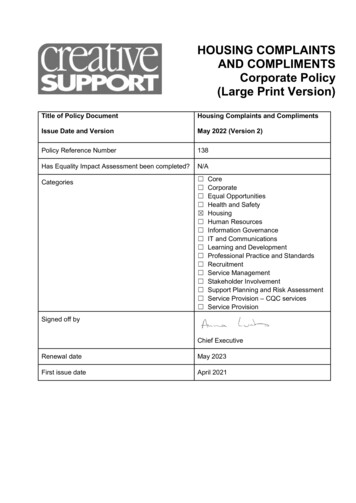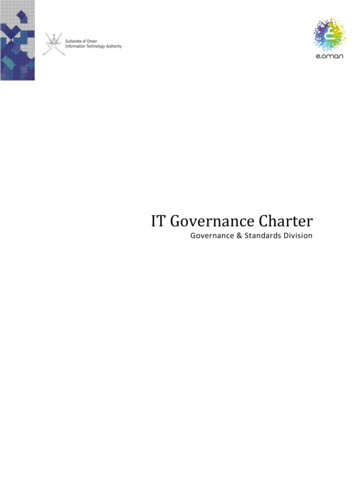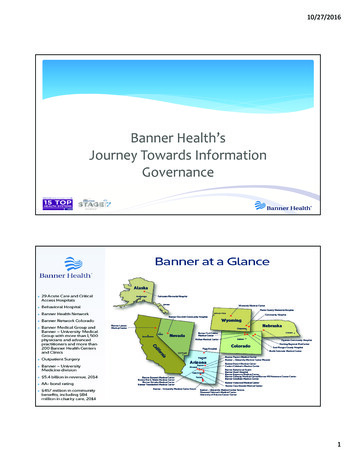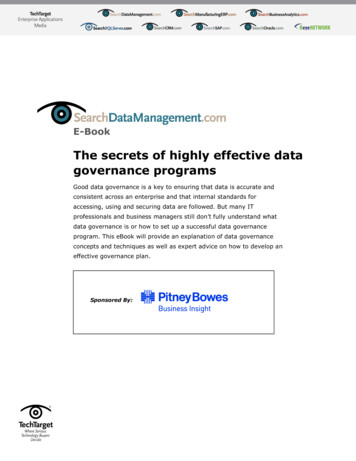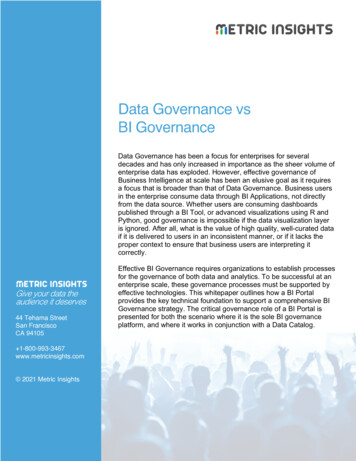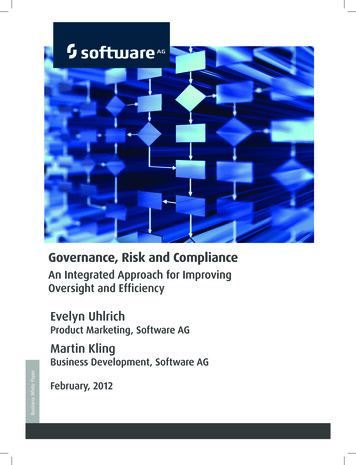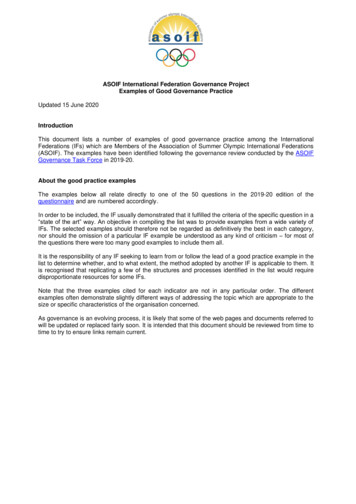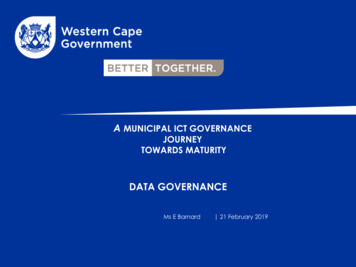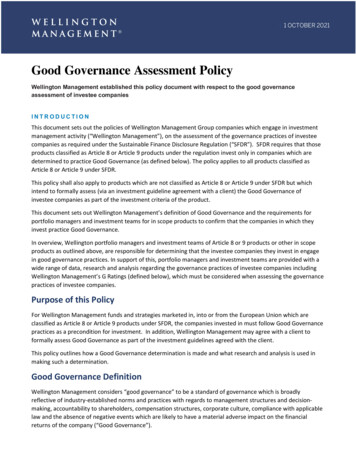
Transcription
1 OCTOBER 2021Good Governance Assessment PolicyWellington Management established this policy document with respect to the good governanceassessment of investee companiesINTRODUCTIONThis document sets out the policies of Wellington Management Group companies which engage in investmentmanagement activity (“Wellington Management”), on the assessment of the governance practices of investeecompanies as required under the Sustainable Finance Disclosure Regulation (“SFDR”). SFDR requires that thoseproducts classified as Article 8 or Article 9 products under the regulation invest only in companies which aredetermined to practice Good Governance (as defined below). The policy applies to all products classified asArticle 8 or Article 9 under SFDR.This policy shall also apply to products which are not classified as Article 8 or Article 9 under SFDR but whichintend to formally assess (via an investment guideline agreement with a client) the Good Governance ofinvestee companies as part of the investment criteria of the product.This document sets out Wellington Management’s definition of Good Governance and the requirements forportfolio managers and investment teams for in scope products to confirm that the companies in which theyinvest practice Good Governance.In overview, Wellington portfolio managers and investment teams of Article 8 or 9 products or other in scopeproducts as outlined above, are responsible for determining that the investee companies they invest in engagein good governance practices. In support of this, portfolio managers and investment teams are provided with awide range of data, research and analysis regarding the governance practices of investee companies includingWellington Management’s G Ratings (defined below), which must be considered when assessing the governancepractices of investee companies.Purpose of this PolicyFor Wellington Management funds and strategies marketed in, into or from the European Union which areclassified as Article 8 or Article 9 products under SFDR, the companies invested in must follow Good Governancepractices as a precondition for investment. In addition, Wellington Management may agree with a client toformally assess Good Governance as part of the investment guidelines agreed with the client.This policy outlines how a Good Governance determination is made and what research and analysis is used inmaking such a determination.Good Governance DefinitionWellington Management considers “good governance” to be a standard of governance which is broadlyreflective of industry-established norms and practices with regards to management structures and decisionmaking, accountability to shareholders, compensation structures, corporate culture, compliance with applicablelaw and the absence of negative events which are likely to have a material adverse impact on the financialreturns of the company (“Good Governance”).
1 OCTOBER 2021In assessing Good Governance, Wellington Management assesses any investment made directly or indirectly in asingle corporate issuer which results in the allocation of capital to such an issuer. Derivative instruments, unlessused to gain long exposure to an investee company such as single name Total Return Swaps or Credit DefaultSwaps, are not included for the purpose of this analysis. Short positions or index positions or companies heldwithin commingled pools or other collective investment schemes in which Wellington Management may investwill generally not be assessed for good governance.Good Governance Assessment RequirementPortfolio managers and investment teams assessing Good Governance are responsible for the ongoingassessment and monitoring of the governance practices of the companies in which they invest in. Such anassessment is inherently subjective, and must be made in the context of their strategy and their fiduciary dutiesto clients using available data and research they deem to be most relevant. Assessment of investee companygovernance practices is complex and may be based on data which is difficult to obtain and incomplete,estimated, out of date or otherwise materially inaccurate.Portfolio managers and investment teams are required to consider Wellington Management’s G Ratings(described below), where available. Portfolio managers and investment teams should additionally assess GoodGovernance using any other reasonably available information which they determine to be material to thegovernance practices of any company in which they invest. Portfolio managers and investment teams should reevaluate their initial assessment on an ongoing basis should they become aware of new events or informationwhich might have a material impact on their determination that a company practices Good Governance.Wellington Management also believes that a governance assessment is an ongoing rather than a point in timeassessment, and portfolio managers and investment teams may from time to time engage directly withcompanies to seek further information, to address concerns and/or to remedy issues with respect to governancepractices that the portfolio managers and investment teams may identify.Governance ResearchPortfolio managers and investment teams perform their own assessment of the governance practices of thecompanies in which they invest and may use any number of internal and external sources. In support of thisassessment, Wellington Management’s dedicated ESG Research Team (the “ESG Research Team”) is responsiblefor providing in-house research, training and consultation with regards to the governance practices of investeecompanies to portfolio managers and investment teams on a periodic and ongoing basis. The ESG ResearchTeam also supports the portfolio managers’ or investment teams’ ability to identify global best practices,prepare for company engagement, collaborate on new research paths, and, where applicable, vote proxies.Wellington Management’s Fundamental G RatingThe ESG Research Team produces a fundamental governance rating on companies they cover based on primaryand secondary research, including direct corporate engagement, which aims to characterise the governancepractices of a company using a 1 through 5 scale (the “Fundamental G Rating”) where 1 is the highest and 5 the
1 OCTOBER 2021lowest rating. The Fundamental G Ratings are available to all portfolio managers and investment teams atWellington Management and should generally be considered the primary data point in assessing goodgovernance of investee companies. In creating the Fundamental G Rating, ESG Research Team Analysts look at anumber of factors including the following: Shareholder Rights - including Share class structure, voting rights, takeover defenses, shareholdermeetings, voting frequency and procedures, quality of information provided to shareholders, and otherrights.Board Structure and Composition – including board diversity, how the board collaborates withmanagement and delineates responsibilities, the diversity of perspectives of board members, Directorattendance and other time or professional commitments, the ability of the board to challenge andcounsel management, the independence and activity level of the board and the process of directorappointments.Compensation – including the extent to which compensation incentives align with the interests ofshareholders, the integration of equity ownership in the company into Executive compensation, thetransparency of the decision-making process and rationale behind compensation plan structures, thestructure and composition of compensation plans with regards to performance target, appropriate risktaking and non-financial criteria incentives, the quantitative and qualitative nature of criteria used inperformance-based compensation and the accountability of compensation committees forcompensation outcomes.Audit Risk and Transparency – including the reliability of data provided by companies, the level oftransparency they provide, the quality and empowerment of internal and external auditors and anypotential conflicts of interest they may have, the frequency, timeliness and scope of internal andexternal audit and controls reports, any restatements of financial results, adverse opinions, materialdeficiencies or identified misstatements in disclosures and any other audit-related events such as achange in or resignation of the auditor.Other factors that ESG Research Team Analysts consider when creating a Fundamental G Rating include anyidentified information or controversies concerning compliance with law and regulatory enforcement actions, taxlaw compliance, Anti-money laundering risk, risk management, weaknesses in corporate controls or breaches instandards of conduct that lead to corporate reputational damage.Wellington Management’s Quantitative G RatingIn addition to the Fundamental G Rating, Wellington Management makes available to portfolio managers andinvestment teams a quantitative governance rating based on a proprietary algorithm which is fed from datafrom multiple select third party sources that provide proprietary scores on company governance (the“Quantitative G Rating”). This Quantitative G Rating represents a simplified rating weighted by a comparison toall other scores in a company’s market-industry universe. Portfolio managers and investment teams will haveaccess to ongoing reporting which will highlight issuers for which Fundamental G Ratings and/or Quantitative GRatings have fallen materially below industry standards.Use of Wellington Management’s G Rating in the Governance Assessment ProcessWhere a portfolio manager or investment team has made a determination with regards to the governancepractices of a company which is not reflected by Wellington’s Fundamental G Rating and/or Quantitative G
1 OCTOBER 2021Rating for such a company, Wellington Management may require additional confirmation of the rationalebehind such an assessment. Factors which may lead a portfolio manager or investment team to this conclusionmay include, but are not limited to, additional information not represented in the constituent data ormethodology informing the G Rating or latency in the G Rating determination based on recent events such as achange in the corporate management team.Wellington Management does not produce a Fundamental or Quantitative G Rating for all companies, andportfolio managers assessing Good Governance are free to invest in companies for which no Rating is produced.Although companies may not have a G Rating for a variety of reasons, typically this occurs where there is a lackof information informing the underlying constituent data due to the nature of the security type or the company,the region in which the company operates or whether the company is a private, or recently private, entity.Certain fixed income investments, such as high yield, bank loans or emerging markets debt issuers do not have aG Rating assigned to them and may be researched and assessed primarily by Wellington Management’s creditanalysts. In researching and assessing corporate governance related to these types of securities, governancemay be assessed by taking into account the nature of the issuer relative to other issuers of a similar type and inthe context of the region or industry in which it operates. Where a portfolio manager or investment teaminvests in a company without a G Rating, such companies should generally be those whose management andboard, to the best of the portfolio manager’s or investment teams’ knowledge, are credible, have a strongcapital allocation track record, promote a strong corporate culture and are appropriately incentivised to run thecompany in a responsible manner.For more information on the research, data and tools which Wellington Management makes available to itsportfolio managers and investment teams with regards to the governance practices of the companies in whichthey invest, please see Wellington Managements disclosure on its ESG and sustainable investment research onwww.wellington.com.
Wellington Management Company LLP (WMC) is an independently owned investment adviser registered with the US Securities and Exchange Commission(SEC). WMC is also registered with the US Commodity Futures Trading Commission (CFTC) as a commodity trading advisor (CTA) and serves as a CTA tocertain clients including commodity pools operated by registered commodity pool operators. WMC provides commodity trading advice to all other clients inreliance on exemptions from CTA registration. WMC, along with its affiliates (collectively, Wellington Management), provides investment management andinvestment advisory services to institutions around the world. Located in Boston, Massachusetts, Wellington Management also has offices in Chicago, Illinois;Radnor, Pennsylvania; San Francisco, California; Frankfurt; Hong Kong; London; Luxembourg; Milan; Shanghai; Singapore; Sydney; Tokyo; Toronto; and Zurich.This material is prepared for, and authorized for internal use by, designated institutional and professional investors and their consultants or for such other use asmay be authorized by Wellington Management. This material and/or its contents are current at the time of writing and may not be reproduced or distributed inwhole or in part, for any purpose, without the express written consent of Wellington Management. This material is not intended to constitute investment advice oran offer to sell, or the solicitation of an offer to purchase shares or other securities. Investors should always obtain and read an up-to-date investment servicesdescription or prospectus before deciding whether to appoint an investment manager or to invest in a fund. Any views expressed herein are those of theauthor(s), are based on available information, and are subject to change without notice. Individual portfolio management teams may hold different views and maymake different investment decisions for different clients. 2021 Wellington Management Company LLP. All rights reserved.V2.0
Wellington Management Company LLP (WMC) is an independently owned investment adviser registered with the US Securities and Exchange Commission (SEC). WMC is also registered with the US Commodity Futures Trading Commission (CFTC) as a commodity trading advisor (CTA) and serves as a CTA to

